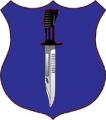Yes I know this Afghanistan business is really getting in the way of normal peacetime army routine. A real bother.
I would suggest that it would be indicative of a professional army to take a war that's sapping the morale of the army and the nation and bleeding the treasury dry to either seriously or get out... and fast.
There are none so deaf as those...All I have seen in support is very simplistic stuff about "knowing the ground" and experience. This isn't stuff we can guess at. We have to have some very solid data on which to base opinions.
The point is simply that this 'little' war is merely an opportunity (it seems) to spread a little war experience around. A new brigadier ever 6 months, a bunch of new COs every 6 months and even more OCs every 6 months. Good for the CVs and maybe a few gongs thrown in.
Ever so thankful to the regiments for fitting in a quick tour of Afghanistan every 2 years... and hell with operational continuity.
To discount the value of operational continuity and knowledge of theater so as to excuse a bad system of allocating forces to the war is really disappointing.
Now this is getting interesting.OK, you'll have no problems getting the bayonets to do their 1 x 1 yr tour. You may have real issues getting 3rd tour seniors to ever come back to theatre, so the "experience" gets lost. Put all that into a 9 year cycle (1 on, 2 off) and the levels of experience in any given BG have eroded to nothing. IIRC come the Falklands 10th anniversary, there were only 14 men in 2 PARA who had deployed on Corporate.
What is being said here? Why would you have trouble getting 3rd tour seniors back?
I could accept that the current arrangement could be excused because the military did not know how long this whole Afghanistan deal would go on for, but my gut tells me it is more a case of trying to give the impression that the army is taking the Afghanistan thingy in its stride. The arrogance thing again.
In such circumstances the continuity comes through the corporals/sgts/CSMs with some more at Capt/Maj/Lt Col level (with over time some of the platoon cmdrs making a come-back at Capt and even Maj level depending on how long the war lasts). The private soldiers will be where the churn takes place.
The trick is to maintain and develop your NCOs as the backbone supporting your Capts/Majs/Lt Cols and select your Platoon Cmdrs very very carefully (you don't have time for the luxury of allowing brand new officers to find their feet under the guidance of an experienced platoon sgt).
Strange to hear you argue that all experience is lost over a relatively short time and from elsewhere we hear that so few officers read the COIN doctrine (and presumably the lessons learned from previous conflicts) yet arrive in a new theatre claiming to be armed with the experience of all these previous conflicts (which the troops deployed in fact know very little about).











Bookmarks